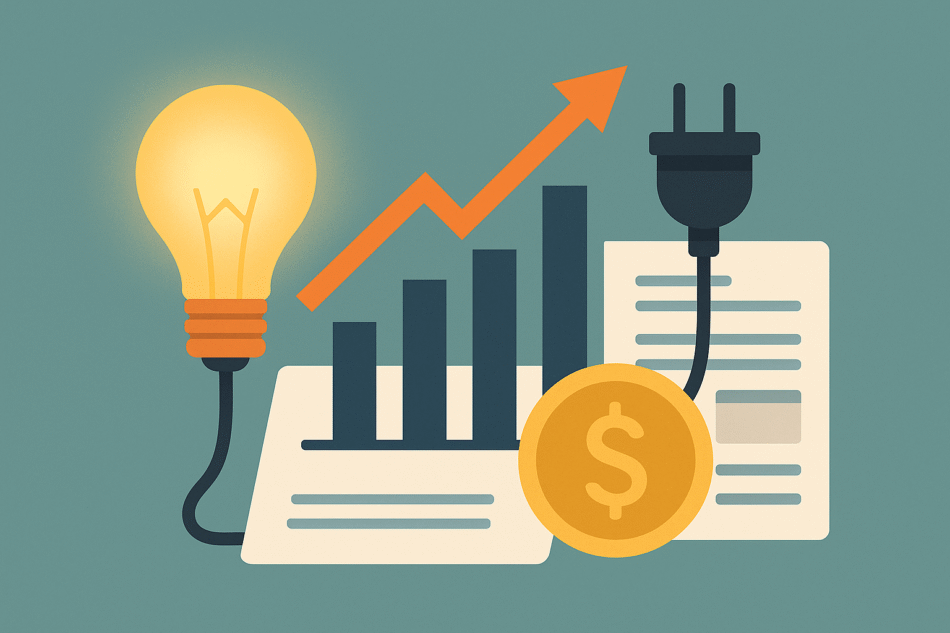When you’re running a business, every decision—from hiring staff to switching suppliers—directly affects your bottom line. Yet, one often-overlooked factor silently chipping away at profits is your energy bill. Specifically, business electricity rates can either empower growth or quietly drain resources.
Unlike residential tariffs, business electricity pricing involves layers of complexity. From fixed versus variable contracts to hidden standing charges, many business owners find themselves locked into deals that don’t serve their best interest. So, let’s take a human approach to demystify electricity rates, and figure out how you can make smarter energy choices.
What Are Business Electricity Rates, Really?
Business electricity rates refer to the price you pay per unit of electricity (measured in kWh), plus a standing charge just for being connected to the grid. While it sounds simple, the devil is in the details.
Most businesses sign energy contracts for a period of 1 to 5 years, often without fully understanding the terms. These rates vary based on factors like business size, usage habits, location, and credit rating. Without proper awareness, it’s easy to overpay or get caught in an unfavorable deal.
Fixed, Variable, or Deemed – Which Tariff Is Right for You?
Choosing the right tariff is just as important as choosing the right supplier. A fixed-rate tariff locks in your unit rate for a specified term, protecting you from market fluctuations. This can be beneficial for budgeting, especially if your business has consistent usage patterns.
On the other hand, variable tariffs follow the wholesale market, meaning your prices could go up or down. Then there are deemed rates, which apply if you’re out of contract—these are notoriously expensive and should be avoided. Knowing your tariff type is the first step to regaining control over your business electricity rates.
Why Do Business Rates Differ from Domestic Ones?
At first glance, you might wonder why businesses pay more than households for electricity. The answer lies in risk and usage. Businesses often use more energy, sometimes during peak hours, which increases costs for suppliers.
Moreover, business tariffs don’t benefit from the same government protections as domestic ones. There’s no energy price cap for commercial customers, and once you sign a contract, you’re usually tied in until it ends. That’s why it’s essential to be proactive when negotiating or renewing your business electricity rates.
Factors That Influence Business Electricity Rates
Size and Consumption
It’s not just about how much electricity you use—it’s also about when and how consistently you use it. A manufacturing unit running 24/7 will have a very different rate compared to a boutique shop with limited hours.
Location and Meter Type
Businesses in different regions may face varying distribution and transmission costs. Additionally, your meter type (standard, half-hourly, or smart meter) affects how your usage is recorded and priced. Understanding these variables can help you compare rates more accurately.
Smart Ways to Compare and Switch Suppliers
Gone are the days when switching suppliers was a hassle. Now, comparison websites and energy brokers make the process simpler than ever. However, it’s not just about picking the cheapest quote—pay attention to contract length, early termination fees, and hidden costs.
Always ask for a breakdown of business electricity rates, including unit rates and standing charges. Sometimes, a slightly higher unit rate with lower standing charges may end up saving you more, especially if your usage is moderate.
The Green Angle – Sustainability and Energy Rates
Many businesses are now moving toward renewable energy contracts—and not just for ethical reasons. Green energy plans often come with competitive pricing and can improve your brand’s environmental credibility.
What’s more, some suppliers offer discounts or incentives for businesses that reduce consumption during peak times or commit to long-term green contracts. So, aligning your values with your electricity contract could be a smart move—both financially and environmentally.
Avoiding Common Pitfalls and Hidden Charges
The fine print in electricity contracts can contain some costly surprises. Rollover contracts, automatic renewals, and excessive out-of-contract rates can lead to significantly higher bills.
Always note your contract end date and set reminders to renegotiate well in advance. If you’re unsure about a clause, don’t hesitate to ask your supplier for clarification. Keeping track of these details can protect your business from unnecessary expenses and inflated business electricity rates.
Looking Ahead – How to Future-Proof Your Energy Strategy
The energy market is evolving, with increased focus on decentralised energy, flexible tariffs, and smart monitoring. Businesses that adopt smart meters and energy management software can better track their usage, identify inefficiencies, and plan accordingly.
In the long run, integrating an energy strategy into your business model can deliver substantial returns. After all, lowering your business electricity rates isn’t just about paying less—it’s about using energy smarter and running your business more efficiently.
Conclusion: Power in Your Hands
Electricity might not be the most exciting part of running a business, but it’s one of the most critical. By understanding the factors that influence business electricity rates, you empower yourself to make informed, cost-effective decisions.
Remember, energy savings aren’t just about reducing bills—they’re about increasing control. So, whether you’re a startup, an SME, or a growing enterprise, take the time to review your energy plan. Your profit margins—and peace of mind—will thank you.
 WhatsApp Us Now
WhatsApp Us Now



